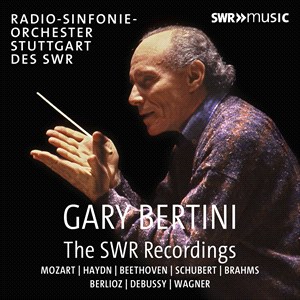

Wolfgang Amadeus Mozart (1756-1791): Symphony No. 40 in G Minor, K550 Franz Joseph Haydn (1732-1809): Symphony No. 53 in D Major, Hob.I:53, "Imperial" Franz Joseph Haydn (1732-1809): Symphony No. 95 in C Minor, Hob.I:95 Ludwig Van Beethoven (1770-1827): Symphony No. 7 in A Major, Op. 92 Franz Schubert (1797-1828): Symphony No. 8 in B Minor, D. 759, "Unfinished" Johannes Brahms (1833-1897): Symphony No. 1 in C Minor, Op. 68 Johannes Brahms (1833-1897): Symphony No. 3 in F Major, Op. 90 Hector Berlioz (1803-1869): Symphonie fantastique, Op. 14 Hector Berlioz (1803-1869): Benvenuto Cellini, Op. 23: Overture Claude Debussy (1862-1918): La damoiselle élue , L. 62 Richard Wagner (1813-1883): Der fliegende Holländer (The Flying Dutchman): Overture, WWV 63 Richard Wagner (1813-1883): Tristan und Isolde, Act I: Prelude, WWV 90 Richard Wagner (1813-1883): Tristan und Isolde, Act III: Mild und leise wie er lächelt, "Isoldes Liebestod" (version for orchestra), WWV 90
Gary Bertini was a highly respected conductor across Europe, Japan, and the United States in his career. But in a generation of 'star' conductors such as Herbert von Karajan, Georg Solti, Lorin Maazel he flew somewhat under the radar. Despite this, he created a fine collection of recordings, including several live recordings, as many are in this collection. His Mahler symphonies collection has long been widely praised and remains a personal favorite.
All the works performed in this set, apart perhaps from the Debussy, are well-known masterpieces and available in a bewildering array of performances and styles. So, one might ask why choose this particular set? None of the performances might be regarded in the 'Essential' category. However, they all reflect the unfailingly urbane style of this conductor, with smaller forces when appropriate, and always with good, sometimes very good recording quality. The fact several are live recordings may be said to add a certain frisson to the listening experience, and the very occasional orchestra flubs or audience/conductor sounds should not trouble the listener.
The Mozart and Haydn symphonies have lightly sprung rhythms and highlight the gentle melancholy of the Mozart minor key symphony with a brisk exciting finale, and the graceful, sometimes boisterous energy in the Haydn.
I found the Beethoven slightly less clear in recorded sound, not enough to really trouble me, and the Schubert is excellent in sound, the cellos and basses at the very start of the second movement are very clear for example.
I grew up with Klemperer's monumental performances of the Brahms 1st symphony, and I have often found myself disappointed in other performances of the opening of the 1st movement in comparison. I found Bertini can get some of the same feeling of confrontation with Fate, and yet without the same overall slower tempi, showing an alert approach common to all the performances. This approach continues in the 3rd symphony, the interpretation portraying the classic autumnal Brahms glow, and effective minor to major transitions at key moments in both symphonies.
The Symphonie Fantastique is a colorful, clean performance. An example, he starts the 1st movement pensively, before jumping into the succeeding faster music representing the troubled artist's mind. Wagner's Flying Dutchman overture has never been a personal favorite, but it is well enough played and recorded, while the Tristan Overture and Liebestod (orchestral version) are finely played.
The last (chronologically) is the Debussy, here sung by the great Romanian soprano, Ileana Cotrubas. The luxuriant harmonies, reflecting the influence of Wagner on the younger composer, are well captured and the singing of the soloist is excellent, as too is the choir (Bertini was an experienced choir trainer having established the Israel Chamber Choir in 1955).
The performances all reflect a supremely civilized style, eschewing extremes of tempo, respecting the composer's directions and with always at least good recording quality and orchestral playing. They make for very enjoyable listening to 19th (and late 18th) century classics.
If your interest is now piqued in reading more about this sadly overlooked conductor, this 2010 release of the Cologne Broadcasts on the Capriccio label should be enough to entice you to explore deeper into the reasons why he's highly considered as a distinctive and distinguished conductor.
Ian Orbell - February 2024 Mozart - Symphony No. 40